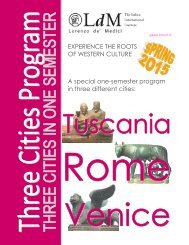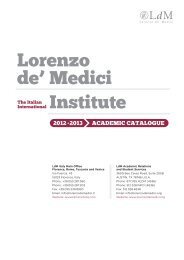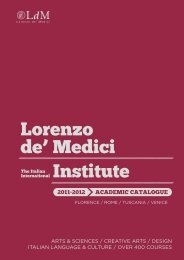aCademiC Catalog 2013-2014 - Lorenzo de Medici
aCademiC Catalog 2013-2014 - Lorenzo de Medici
aCademiC Catalog 2013-2014 - Lorenzo de Medici
You also want an ePaper? Increase the reach of your titles
YUMPU automatically turns print PDFs into web optimized ePapers that Google loves.
Supply Chain Management in the<br />
Mediterranean Basin<br />
BUS 265 R<br />
Cr: 3; Contact hrs: 45<br />
Supply chain management is a relatively new area of study in<br />
the management discipline. The supply chain could be <strong>de</strong>fined,<br />
as Christopher does, as “the network of organizations that<br />
are involved … in the different processes and activities that<br />
produce value in the form of products and services in the hands<br />
of the ultimate consumer.” Thus supply chain management<br />
is concerned with the total flow of goods and services: from<br />
original inputs to final consumption. This implies that supply<br />
chain management is concerned with the concept of total<br />
integration, linkage and coordination of all entities involved<br />
in moving a product or service downstream to the final user.<br />
Supply chain management advocates a cooperative approach<br />
with channel partners. More and more companies are realizing<br />
that the real competition is not company against company but<br />
rather supply chain against supply chain. Such an approach<br />
makes the supply chain as a whole more competitive through<br />
the value it adds and the costs that it reduces overall. This<br />
course offers stu<strong>de</strong>nts the chance to study this new and exciting<br />
area of business. Topics to be covered in this module inclu<strong>de</strong>:<br />
logistics, structure and supply chain management; purchasing<br />
consi<strong>de</strong>rations in supply chain management; supplier<br />
relationships; managing quality; matching supply and <strong>de</strong>mand<br />
and the concept of lead-time in the supply chain; souring and<br />
managing suppliers; buying consi<strong>de</strong>rations; global logistical<br />
issues; the role of technology in the supply chain; and future<br />
challenges of supply chain management. A complementary<br />
part of this course is the analysis of case studies, which inclu<strong>de</strong>s<br />
the analysis of concrete examples about intra- and inter-firm<br />
relationships in specific economic sectors. In this regard, a<br />
particular emphasis is on the petrochemical and agro-industrial<br />
supply chains entirely organized in the Mediterranean region.<br />
Note: this course is offered in partnership with the School of<br />
Management, Marist College, which is AACSB accredited.<br />
Prerequisites: BUS 178 Principles of Microeconomics or BUS<br />
180 Principles of Macroeconomics, or equivalents<br />
Global Business and Society<br />
BUS 282 R<br />
Cr: 3; Contact hrs: 45<br />
This course explores challenges facing mo<strong>de</strong>rn corporations<br />
in organizing cross bor<strong>de</strong>r activities. Specifically, it appraises<br />
the main economic theories of <strong>de</strong>terminants of international<br />
business activities, and it offers a global perspective on<br />
long-term change in the world economy and the interaction<br />
between countries. Special attention is focused on the<br />
dynamics of international tra<strong>de</strong> and investment, including<br />
the relationship between tra<strong>de</strong> and economic growth, tra<strong>de</strong><br />
imbalances and protectionism. The course also looks at the<br />
role of economic and political institutions (WTO, IMF, etc.) and<br />
examines the main characteristics of the emerging economies,<br />
for instance India and China. Themes inclu<strong>de</strong> competition,<br />
<strong>de</strong>velopment, exchange rate theory, the international monetary<br />
system, ethics, <strong>de</strong>cision-making, and strategic operations in<br />
an international environment. Finally, the course examines a<br />
variety of alternative perspectives on the origins and processes<br />
of globalization.<br />
Note: this course is offered in partnership with the School of<br />
Management, Marist College, which is AACSB accredited.<br />
Prerequisites: BUS 178 Principles of Microeconomics, or BUS<br />
180 Principles of Macroeconomics, or equivalents<br />
The Global Economy<br />
BUS 295 R; Dual listed: POL 290 R<br />
Cr: 3; Contact hrs: 45<br />
In the age of globalization both domestic and foreign<br />
economic policies play an important role in <strong>de</strong>termining firms’<br />
strategies. Un<strong>de</strong>rstanding such policies is an essential part of<br />
the cultural background of managers at all levels of a firm.<br />
At the same time, market choices have a greater impact on<br />
economic policymaking in a global economy, as the range of<br />
alternatives open to them expands. The course focuses on<br />
analyzing both si<strong>de</strong>s of this relationship. Special emphasis is<br />
placed on current issues: in policymaking on the basis of social<br />
choice principles and the normative and positive theory of<br />
economic policy; and issues concerning the establishment of<br />
international public institutions that can match the global reach<br />
of private institutions that generate many of today’s economic<br />
challenges. The emphasis of the course will be in providing<br />
stu<strong>de</strong>nts with sound theoretical and empirical foundations for<br />
analyzing strategic behavior by firms and the implications for<br />
industrial structure, welfare and regulation. Applications will<br />
focus on recent <strong>de</strong>velopments in online markets, markets for<br />
digital products, and network industries - covering issues such<br />
as intellectual property rights, the Microsoft case, and access<br />
pricing in networks.<br />
Note: this course is offered in partnership with the School of<br />
Management, Marist College, which is AACSB accredited.<br />
Prerequisites: BUS 178 Principles of Microeconomics or BUS<br />
180 Principles of Macroeconomics, or equivalents<br />
Economic Geography of the Mediterranean<br />
Region<br />
BUS 308 R<br />
Cr: 3; Contact hrs: 45<br />
The Mediterranean region is an important “macro-space” both<br />
economically and politically. Even if its importance has been<br />
broadly recognized, there is a lack of systematic studies about<br />
it. In fact, the Mediterranean region is a very complex space<br />
in which it is possible to acknowledge, on the one hand, the<br />
real potential of its economic <strong>de</strong>velopment, but also, on the<br />
other, the existence of many imbalances among the regions of<br />
which it is composed. This course analyses the Mediterranean<br />
socioeconomic dynamic, examining such issues as flows of<br />
goods, capitals and people, and the different production<br />
systems which characterize the Mediterranean sub-regions<br />
(Southern Europe, Western Balkan, Middle East, Mashrak,<br />
Persian Gulf and Maghreb). Similarities, contrasts and parallels<br />
will be drawn in the comparative study of these sub-regions.<br />
The course will also take into account the external influences of<br />
the European Union, USA, Russia and China, that impact on the<br />
region in different ways.<br />
Prerequisites: BUS 178 Principles of Microeconomics or BUS<br />
180 Principles of Macroeconomics, or equivalents<br />
Approaches to Management<br />
BUS 320 R<br />
Cr: 3; Contact hrs: 45<br />
This course focuses on the assessment, analysis, and<br />
application of management style to personal and organizational<br />
effectiveness. The objective is to present operationally <strong>de</strong>fined<br />
methods for assessing management style. The key variables are<br />
motive patterns, psychological types (MBTI), boss-subordinate<br />
interactions, power bases, and problem-solving styles.<br />
Note: this course is offered in partnership with the School of<br />
Management, Marist College, which is AACSB accredited.<br />
Prerequisites: good knowledge of basic principles of<br />
management<br />
International Project Management and<br />
Fundraising<br />
BUS 325 R<br />
Cr: 3; Contact hrs: 45<br />
This course seeks to give stu<strong>de</strong>nts a basic skill set, which<br />
will enable them to successfully <strong>de</strong>velop and implement<br />
any international cooperation projects without succumbing<br />
to mismanagement and to budgetary shortcomings. The<br />
course offers an introduction to key consi<strong>de</strong>rations in the<br />
implementation of international cooperation projects and<br />
in particular to the basic principals of mo<strong>de</strong>rn project<br />
cycle management, including such themes as fundraising,<br />
campaigning and budgeting. Particular attention will be paid<br />
to the un<strong>de</strong>rstanding of fundraising, including i<strong>de</strong>ntifying<br />
fundraising needs and goals; <strong>de</strong>signing a viable campaign;<br />
creative fundraising activities; and grant writing. The emphasis<br />
of the course is on the world of non-profit organizations but<br />
some attention is also <strong>de</strong>voted to the for-profit dimension and<br />
to elements of international business which are common to<br />
both. Guest speakers may be invited to share their experiences<br />
in managing projects and fundraising for such organizations as<br />
UNICEF and FAO.<br />
School of Arts & Sciences ROME<br />
LdM Aca<strong>de</strong>mic <strong>Catalog</strong> <strong>2013</strong>-<strong>2014</strong><br />
139





